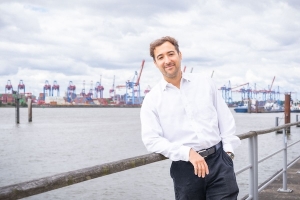


(Posted on 16/08/24)
Although having access to connectivity at sea is widely considered an important part of seafarer wellbeing, there are emerging signs of negative consequences. Mental Health Support Solutions (MHSS) has witnessed first-hand the detrimental effects of social media on seafarers' mental health, particularly among Indian seafarers, and it's time for authorities to take decisive action.
MHSS CEO and Clinical Psychologist Charles Watkins said: “The extensive use of social media is a multi-layered problem that provides users with a false sense of connectivity onboard, increasing social distance and declining mental health.”
Indian seafarers of all ages are suffering. The older demographic (25-35) feels left behind, missing important life events, while younger seafarers (20-25) experience desperation due to a lack of contact. This digital disconnect heightens the isolation felt by many and must be addressed urgently.
One issue that is becoming particularly alarming is that Indian seafarers are bombarded with misleading online portrayals of life at sea, seeing depictions of a perfect balance between work, partying, and socialising. Once the seafarers are on board, they feel that these unrealistic portrayals do more harm than good, leading to severe disillusionment and exacerbating mental health issues.
MHSS consultant Shreya Menon, a psychologist and psychotherapist based in India, highlights that many Indian seafarers go months without connectivity, missing out on vital support networks. Ms. Menon said: “I often speak with seafarers who say, ‘You didn’t tell me X, Y, or Z,’ because they’ve been misled by online representations. The reality of life onboard is often a shock especially for young Indian seafarers joining a ship and finding a very different situation than land where they are surrounded by family.”
MHSS calls on authorities to take immediate action to clamp down on misinformation and misleading footage being shared on social media. Regulatory bodies need to enforce measures that reflect the needs of the crews who keep the industry afloat and protect their mental health.
Charles Watkins added: “Regulation is crucial to ensure that Indian seafarers are not misled by idealised portrayals of life at sea. Authorities must step in to monitor and remove harmful content that contributes to mental health issues. In addition, I recommend initiatives to prepare and educate seafarers about the actual life at sea to counter the flood of misinformation and give them a better understanding of the real experience and challenges.”
Torvald Klaveness has announced the decision to consolidate all digital services under Klaveness Digital... Read more
The International Association of Dry Cargo Shipowners (INTERCARGO) has renewed its call for straightforward... Read more
The Swedish Club has delivered strong results for 2024, posting a USD 34 million profit and significantly... Read more
In line with NORDEN’s positive long-term outlook for Capesize freight rates, the company have... Read more
OrbitMI, a global provider of maritime software and data products, has expanded its workflow capabilities... Read more
Current ClassNK Senior Vice President Hayato Suga has been appointed as President & CEO as well... Read more
The surge in demand for Cape Size bulk carriers will continue for another six weeks, driven on by increased... Read more
OrbitMI, a leading provider of maritime SaaS software, has announced that Istanbul-based Statu Shipping... Read more
“The International Association of Dry Cargo Shipowners (INTERCARGO) is deeply saddened by the... Read more
As the shipping industry continues its transition to carbon-neutral fuels, ammonia and hydrogen are... Read more